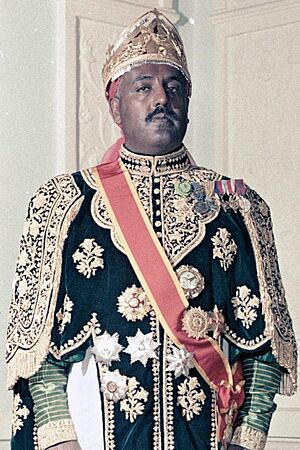Aserate Kassa facts for kids
Quick facts for kids Aserate Kassa |
|
|---|---|
| Leul Ras |
|
 |
|
| Born | 30 April 1922 |
| Died | 23 November 1974 (aged 52) Akaki Prison, Addis Ababa, Ethiopia |
| Spouse | Le'ult Zuriashwork Gebregziabher |
| Issue | Asfa-Wossen Asserate Mulugeta Asrate |
| Dynasty | Solomonic dynasty (Selale branch) |
| Father | Kassa Haile Darge |
| Mother | Tsigemariam Beshah |
| President of the Crown Council | |
| In office 29 July 1971 – 12 September 1974 |
|
| Monarch | Haile Selassie I |
| Succeeded by | office abolished |
| Viceroy of Eritrea | |
| In office 3 July 1964 – 4 December 1970 |
|
| Monarch | Haile Selassie I |
| Prime Minister | Aklilu Habtewold |
| Preceded by | Abiye Abebe |
| Succeeded by | Debebe Hailemariam |
Leul Ras Aserate Kassa was an important leader in the Ethiopian Empire. He was born Aserate-Medhin Kassa on April 30, 1922, and passed away on November 23, 1974. He held the title of Viceroy of Eritrea and was part of Ethiopia's noble families.
Aserate Kassa was the fourth son of Ras Kassa Haile Darge and Princess Tsige Mariam Beshah. He studied in the United Kingdom at Monkton Combe School from 1937 to 1938. He married Princess Zuriashwork Gebre-Igziabiher, whose grandmother was Empress Menen Asfaw, the wife of Emperor Haile Selassie I. Prince Aserate Kassa was a leader of a branch of the Imperial Solomonic dynasty, which was the ruling family of Ethiopia for a long time.
Contents
A Life of Service
Important Roles in Government
During the time Emperor Haile Selassie I ruled Ethiopia, Aserate Kassa held many important jobs. He served as the Governor of different areas, including Arsi and Shewa.
From 1961 to 1964, he was the president of the Ethiopian Senate. This was a very important role in the country's government.
Leading Eritrea
In 1964, Aserate Kassa was chosen to be the Viceroy of Eritrea. This meant he was the Emperor's main representative and leader in that region.
He faced challenges in Eritrea, as there was growing unrest and a desire for independence. Aserate Kassa tried to handle this in two ways. He created special armed groups to keep peace. He also tried to talk with people to find peaceful solutions.
However, the situation became more difficult. Other officials, like Prime Minister Aklilu Habte-Wold, had different ideas. They wanted the army to take stronger actions.
Challenges and Changes
By 1968, there were serious fights between rebels and Ethiopian military forces. Aserate Kassa tried to convince Emperor Haile Selassie not to declare strict military rule in Eritrea. He wanted to avoid more conflict.
Despite his efforts, the Emperor eventually allowed major military actions. These actions did not stop the unrest. In 1970, Aserate Kassa was called back from Eritrea. Military rule was declared, and a new military governor was appointed.
President of the Crown Council
Even after leaving Eritrea, Aserate Kassa remained important. In July 1971, Emperor Haile Selassie chose him to lead the Crown Council of Ethiopia. This council was meant to help manage the country and prepare for a smooth transfer of power when the Emperor passed away.
However, things changed suddenly in Ethiopia. The Emperor was removed from power, and a new group called the Derg took control. Aserate Kassa was arrested.
Final Years
Sadly, Aserate Kassa was executed on November 23, 1974, along with many other officials from the Imperial government. His wife, Princess Zuriashwork, was imprisoned for 14 years before she was released.
His son, Asfa-Wossen Asserate, later became a political expert in Germany.
Honours
Aserate Kassa received many awards and honours during his life, both from Ethiopia and other countries. These awards recognized his service and importance.
- Ethiopian honours
 - Knight Grand Cross of the Order of the Holy Trinity
- Knight Grand Cross of the Order of the Holy Trinity - Knight Grand Cross of the Order of Menelik II
- Knight Grand Cross of the Order of Menelik II - Knight Grand Cross of the Order of the Star of Ethiopia
- Knight Grand Cross of the Order of the Star of Ethiopia
- Foreign honours
 - Knight Grand Cross of the Royal Victorian Order (GCVO)
- Knight Grand Cross of the Royal Victorian Order (GCVO) - Grand Cross, First Class of the Order of Merit of the Federal Republic of Germany
- Grand Cross, First Class of the Order of Merit of the Federal Republic of Germany - Knight Grand Cross of the Order of Orange-Nassau (awarded on January 24, 1969).
- Knight Grand Cross of the Order of Orange-Nassau (awarded on January 24, 1969). - Knight Grand Cross of the Order of Isabella the Catholic (awarded on April 27, 1971).
- Knight Grand Cross of the Order of Isabella the Catholic (awarded on April 27, 1971).
 | May Edward Chinn |
 | Rebecca Cole |
 | Alexa Canady |
 | Dorothy Lavinia Brown |

